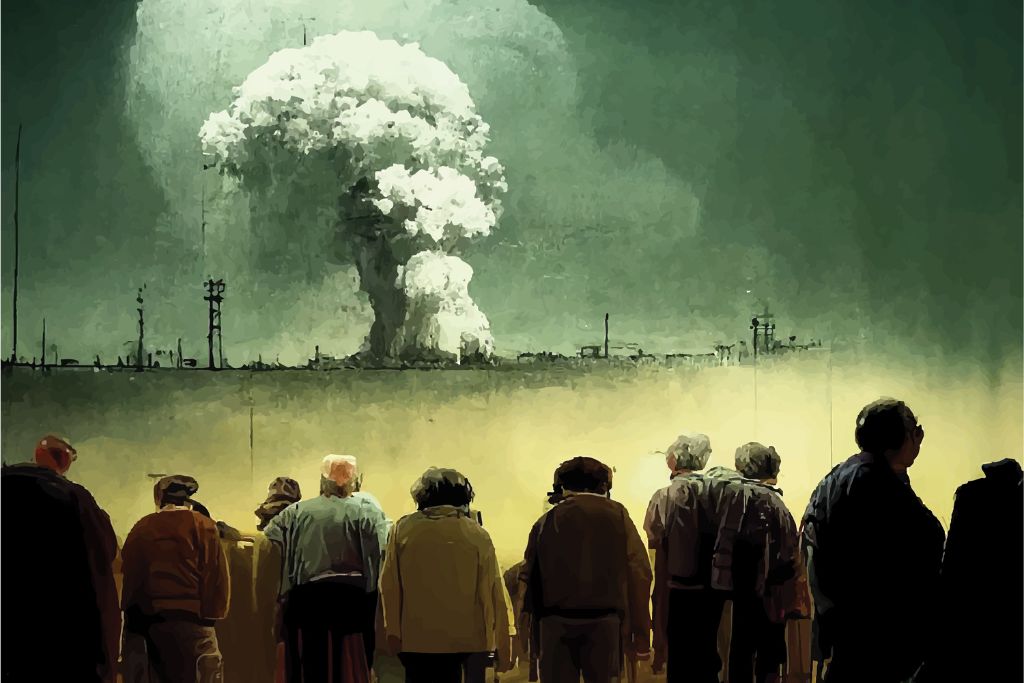During World War II, the world saw a terrible event that had never happened before and would change the course of history for good. On August 6, 1945, American troops dropped an atomic bomb on the Japanese city of Hiroshima. Another atomic bomb was dropped on Nagasaki three days after the first one. Even now, the choice to use these weapons is still very controversial and debated a lot. In this blog post, we’ll talk about what led to the use of the atomic bomb in Japan, what happened afterward, and how it changed Japan and the rest of the world. So fasten your seat belts and get ready to learn about one of the most important events in modern history: the use of the atomic bomb in Japan.
What is the atomic bomb?
The atomic bomb is a weapon of mass destruction that harnesses the power of nuclear reactions. It works by releasing an enormous amount of energy in the form of heat, light, and radiation. The first atomic bomb was developed during World War II as part of the Manhattan Project.
Fissile material (typically uranium or plutonium) plus a neutron source make up an atomic bomb. These two components form an energy-releasing chain reaction when combined. The atomic bomb’s instantaneous heat and pressure make it destructive. Explosions can level buildings for miles and wreak massive devastation.

Despite its devastating impact on human life and property, some argue that the use of atomic bombs helped bring about an end to World War II more quickly than would have been possible otherwise. However, others maintain that such weapons should never be used under any circumstances due to their catastrophic effects on civilians and future generations alike.
The decision to use the atomic bomb in Japan
The decision to use the atomic bomb in Japan was a controversial one that divided opinions and sparked debates for decades. Some argue that it was necessary to end the war quickly, while others believe it was an immoral act of unnecessary destruction.
President Harry S. Truman ordered the bombing of Hiroshima and Nagasaki on August 6th and 9th, 1945 respectively, after Japanese leaders refused to accept Allied demands for unconditional surrender.

Truman’s choice was affected by a number of things, such as his fears of a long war with Japan, his worries about the Soviet Union’s involvement in Asia, and the pressure from military advisers who said that using the bomb would save American lives by shortening the war.
Critics have asked if all other options were tried before such extreme steps were taken. Some historians say that Japan was already close to giving up before the atomic bombs were dropped because of the economic sanctions, the blockade, and the many air battles.
The aftermath of the atomic bomb in Japan
Japan suffered from the atomic bomb. The explosion killed 80,000 and injured thousands. Many endured lifelong burns, radiation illness, and other disabilities.
The bomb totally wiped out the city of Hiroshima, and just three days later, another atomic bomb did the same thing to the city of Nagasaki. These events changed the course of World War II because Japan understood that it couldn’t win against weapons that were so destructive.

In addition to physical damage, there were also psychological effects on those who survived the bombing. Many suffered from post-traumatic stress disorder (PTSD) and struggled to cope with what they had witnessed.
Also, generations that came after these attacks still had problems with their genes because they had been exposed to radiation. Even now, people are still having health problems because of what they were exposed to years ago. It is clear that the effects of the atomic bomb on Japan on both people and society as a whole will last for a long time.
The Legacy of the atomic bomb in Japan
The atomic bombing of Hiroshima and Nagasaki in 1945 left a devastating legacy on Japan. The immediate aftermath saw countless deaths, destruction of infrastructure, and immense suffering for those who survived the bombings.
However, the legacy of the atomic bomb extends beyond these initial effects. The impact has been felt for generations through physical health problems caused by radiation exposure, mental health issues such as survivor’s guilt and PTSD, and societal changes resulting from increased anti-nuclear sentiment.

One example is the Peace Memorial Park in Hiroshima, which reminds people about how terrible nuclear war is. Japan became one of the most important countries working for nuclear disarmament and steps to stop the spread of nuclear weapons. This led to things like the Non-Proliferation Treaty (NPT), which tries to stop more nuclear weapons from being made and used.
“The Use of Atomic Bombs in Japan” has been intensely studied, provoking observations on nuclear weapons’ long-term effects. Current events also shape societies. Brazil’s Supreme Court restricted gun sales to promote public safety and reduce gun violence. Judicial institutions are committed to reducing firearm dangers. Brazil wants to improve security via background checks and waiting times. This decision demonstrates a shared responsibility for citizen well-being by addressing current issues.
